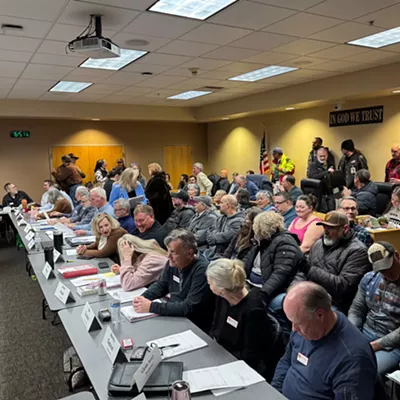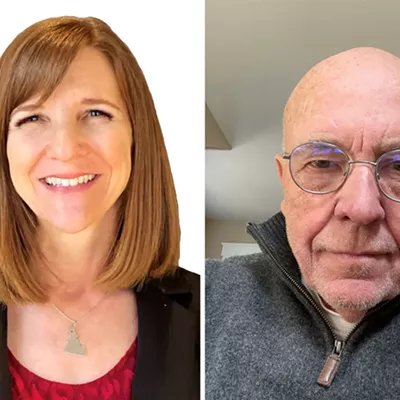Just days after Christmas, Kootenai County's Board of County Commissioners met with county Treasurer Steve Matheson to discuss his recent discovery: Assessor Béla Kovacs had been secretly recording his conversations with treasurer's office staff, and had likely recorded other county staff and officials.
On Dec. 28, Matheson told the three commissioners about his efforts "exposing this unseemly activity, as well as uncovering some of the actual recordings," which he requested from Kovacs as public records.
Kovacs sent Matheson 15 recordings, which included two recordings from one executive session — an official and confidential meeting that the public is not allowed to attend.
Matheson was present at the executive session in question. Those closed-door meetings enable government bodies to discuss issues such as whether to hire or fire someone, or to discuss pending litigation with their attorney. No minutes are kept, although government officials are bound by Idaho state law not to take any final votes, with deliberation and final action to take place during a public meeting.
Commissioner Leslie Duncan notes that their attorney sometimes reminds attendees that executive session conversations are not to be shared.
Kovacs' recordings also raised another major question for the commissioners: Is it OK to do something that's legal, even if others would find it unethical?
Idaho law requires "one-party consent" to make an audio recording, meaning if you are talking to someone you're allowed to record without asking their permission. That's different from Washington's law, which requires consent from all parties, meaning you need to ask everyone involved before recording a conversation.
"As we all know, Idaho is a single-party consent state, and I'm not exactly sure how to proceed with this information," Matheson told the commissioners. "This is my attempt to simply let everyone know what I have discovered."
Kootenai County Prosecuting Attorney Stanley Mortensen told the commission the recordings would be considered documents subject to public records requests and should be saved and stored on county hardware.
Matheson asked: How many recordings are there? Have members of the public been recorded? Where are the recordings stored? How can they be expeditiously released to the public? And are they being stored in accordance with the county's document retention policy?
The first question from Kovacs, who was present at the meeting, was, "Do I have an attorney representing me here?"
He said he made the recordings based on his understanding of what can be considered personal notes.
"I have done it with the intent of capturing essence of information," Kovacs said. "Actions of the commissioners — and I'm not referring to you Bruce — and other elected officials have given me cause for concern as to whether or not the conduct and the actions have all been narrowly legal."
Kovacs said he didn't know how many recordings he'd made, and that he didn't want to say more because he's requested an investigation from the Idaho State Tax Commission.
"My intentions and my plans are to make this part of that investigation," Kovacs says. "I don't want to do anything that would inhibit or compromise the investigation."
Matheson questioned whether an investigation had actually been opened, citing an email from the tax commission that said Kovacs' complaint from late 2023 was too broad. Matheson has since requested an investigation from the commission.
Commissioner Bruce Mattare told Kovacs that in the future, he should consider asking three questions Mattare heard from an attorney who worked under the Reagan administration.
"'Is it right?' 'How will it look in the papers?' and 'Is it against the law?' And depending on the sequence that you ask those questions tells a lot about the kind of person you are," Mattare said. "If you ask 'Is it right?' and the answer is 'No,' then you don't have to worry about the other two questions."
BROKEN TRUST
Kovacs has faced repeated criticism from elected officials and employees who work in his office since he was appointed to fill the role in May 2020 after the death of the previous assessor.
Since then, multiple important deadlines have been missed that impact how taxes are collected in the county. Staffers say that Kovacs has created a toxic work environment, and several experienced employees have quit or retired early since he started.
Half of the roughly 60 assessor's staff members asked Kovacs not to run to keep his seat in 2022. The commissioners and other elected officials asked him to step down that year. After he refused, the commissioners slashed his salary from $90,000 to $45,000 in August 2022. A judge later required the commissioners to reinstate Kovacs' full pay.
Before he was re-elected in November 2022, Kovacs hired an attorney to attempt to block the release of public records from his time working as the purchasing director for Spokane County. In February 2023, months after his success at the ballot box, the Inlander received those records, which showed he'd resigned in lieu of termination after an investigation into similar issues reported by his employees in Spokane.
Kovacs did not respond to multiple requests for comment for this story.
During public comment at the Dec. 28 meeting, Jill Smith, chief deputy treasurer for Kootenai County, told Kovacs how disappointed she was.
"While what you have done is legal, in my opinion, and this is just my opinion, it's not moral, it's not ethical, it's not respectful, and it does nothing to establish or rebuild trust with the departments and the people that you work with," Smith said.
Matheson says he wonders if the recordings match what Kovacs has written in emails about specific meetings or staff conduct.
"There's a lot of people that have chosen to leave the assessor's office since he's been in office," Matheson says. "Many of those decisions were supported by written correspondence or language he shared with his staff. I'm wondering if the public records that are audio recordings of these interactions corroborate that."
Commissioner Bill Brooks says he's concerned about Kovacs' behavior.
"This is outrageous. How dare he," Brooks says. "This goes to fundamental trust. He has violated that nine ways from Sunday. There's no way you can trust this man. I would not want to be one of his employees, and he has pretty much destroyed the morale in that office."
Brooks is also doubtful that Kovacs will truthfully provide a list of the recordings — potentially including many more than the 15 conversations involving treasurer's staff, but possibly no more from executive sessions since Kovacs insisted he didn't record multiple sessions — and fulfill requests. The assessor's office is handling the Inlander's public records requests concerning the recordings.
"If your character is such that you were recording executive sessions, you'd be the last to rely on to tell anybody how many were made and where they are now," Brooks says. ♦
























